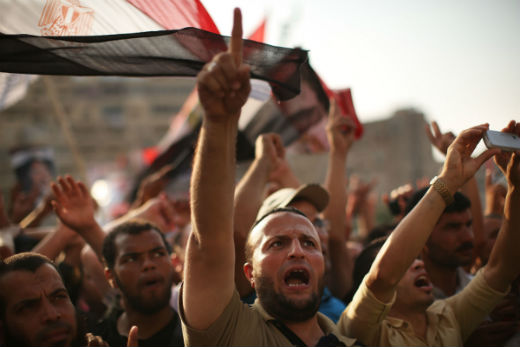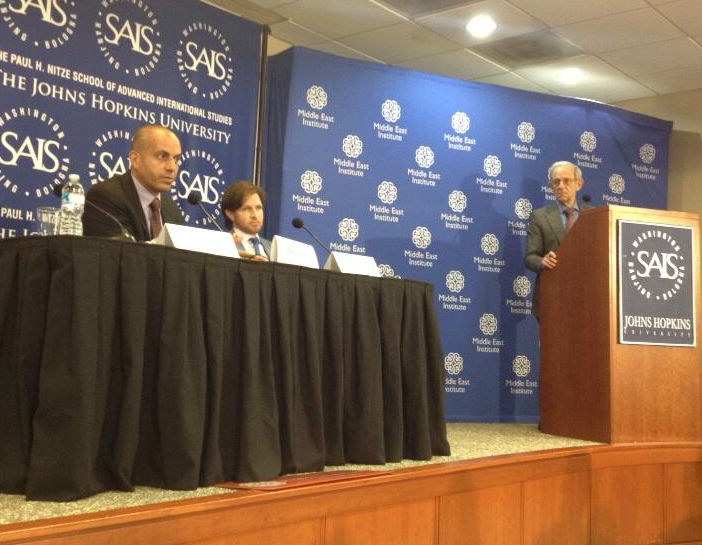Summary by Alexa Cerf
The Middle East Institute, in conjunction with the Conflict Management Program at the School of Advanced International Studies (SAIS) of Johns Hopkins University, was pleased to host an event titled “The Future of Political Islam in Egypt Post-Morsi” on August 5, 2013. Dr. Ahmad Atif Ahmad, Professor of Religious Studies at the University of California, Santa Barbara, and Dr. Jonathan A. Brown, Associate Professor of Islam and Muslim-Christian Understanding at the Edmund A. Walsh School of Foreign Service at Georgetown University, discussed the thinking and strategy of Islamist actors in Egypt in the wake of Mohamed Morsi’s ouster. Daniel Serwer, scholar at The Middle East Institute and Senior Research Professor of Conflict Management at SAIS, moderated.
MEI Senior Vice President Kate Seelye began the event by recalling MEI’s vast amount of programming on Egypt since the launch of its Arab Transitions initiative in April. MEI has a strong history of welcoming a diversity of voices and opinions on important issues, and the various programs this summer regarding Egypt have reflected that tradition.
Dr. Brown began his remarks by reminding the audience to keep in mind the huge amount of human suffering going on in Egypt as a consequence of the political and social forces he would be analyzing. He called the Islamist experience of the last two years “the best laid plans of mice and men,” but emphasized his optimism for Egypt’s future.
Dr. Brown noted that after 2011 Islamist organizations had to carefully craft their relationship with politics. He explained that both the Muslim Brotherhood and the formerly militant Islamist group al-Gamaa al-Islamiyya, which renounced violence in 1997 decided to go “whole-hog” into political activism, creating political parties that were not independent entities. In contrast, Dr. Brown offered the example of the Salafi Nour Party, which “approached this issue from a very theoretically sophisticated point of view” and created “the best model for the relationship between its core religious organization and its political wing.” Nour could draw on the support of its parent organization, al-Dawa al-Salafiyya (the Salafi Call), but the party could be jettisoned if needed at no cost to the original group. Dr. Brown noted that Nour experienced a “tragic moment” when the personalities in the Salafi Call were too strong to be contained and the well-designed political structure began to crumble. Dr. Brown asserted that Nour is not going to be a force in Egypt’s future, given it’s backing of Morsi’s ouster.
Moving on to the present situation, Dr. Brown stated that Egypt is at a “point of intense crisis.” He emphasized that the overthrow of Morsi cannot be justified with the phrase, “The Egyptian people have spoken,” and that there is not just one side of the current conflict. He estimated that millions of demonstrators have come out to support Morsi and call for a return to law and order, and that they have no intention of going home.
“When I was in school, all anybody could ask was ‘Are Islam and democracy compatible?,’” Brown said, noting the irony that now Islamists who support the pro-Morsi cause stand on a platform stressing a return to the constitution, to law and order, and to the democratic process.
Looking forward, Dr. Brown surmised that the Muslim Brotherhood is in a position of potential complete annihilation. He explained that the pro-law and order sentiment will have to find “other homes” to exist in, as the Muslim Brotherhood network is unsustainable under the current leadership structure.
Dr. Brown lamented that the two sides in the impasse are incredibly far apart, but expressed hope in initiatives presented by some leading Islamist intellectuals. For example, Mohammad Salim al-Awa has proposed that Morsi return in a purely transitional role, handing over power to a prime minister in order to keep Egypt democratically and constitutionally legitimate. Dr. Brown added that he sees no possibility for Morsi to return to power in any sort of meaningful way. Finally, Dr. Brown hypothesized that Islamist organizations, faced with the question of whether or not they should be involved in politics, would now “resoundingly” answer “absolutely not.”
Dr. Ahmad began his remarks by noting that Egypt is characterized by division, confusion, and the “willingness to go from one extreme to another in a relatively short period of time.” He proposed that the sources of this division go back to the initial uprising, which people interpreted differently. The questions “Why did the initial uprising happen?” and “What did the majority want?” have no single answer because there were so many problems leading into 2011. This became especially problematic, Dr. Ahmad asserted, when individuals became leaders who were supposed to speak in the name of the people.
Regarding the army, Dr. Ahmad explained that people liked the army in February of 2011, disliked it by May 2012, liked it again by July 2013, and in the future they may dislike it again. Dr. Ahmad then focused on the divisions within Islamist groups, stressing that many splits arose in 2011 when the groups were faced with the new choice of whether to participate in politics.
Dr. Ahmad expanded on the history of Egyptian turmoil, recalling disorder in 1910, during World War I, and after the broken promises of President Woodrow Wilson. Historically, Dr. Ahmad observed, agitation tends to decrease, and thus the current “political energy will run out.” He commented that Islamist actors will react differently to however the current situation concludes: some will return to a life void of politics while others will act as individuals and attempt to participate in politics again.
Dr. Ahmad concluded with a point about U.S. policy, saying that it would “get more by doing less,” despite it being painful to take a step back. The United States, he said, is still an outsider, and there is no reason for it to pretend to understand what it does not understand. As such, it should “take a deep breath [and] maybe learn something about what is going on” before making any decisions.
In the question and answer session, moderator Daniel Serwer asked whether there is a potential for people to react to their disappointment in democratic politics with violence. Dr. Brown noted that the most extreme Islamists have vocally rejected violence, and there has been no evidence to the contrary. But he added that in a time of intense polarization and despair, there is a danger that some Islamists might abandon their ideological ground. Dr. Ahmad responded that no one can preclude the possibility of increased violence in Egypt.
In response to a question regarding the characteristics of political Islam, Dr. Brown allowed that the Muslim Brotherhood is a political creature, and that “everything is political,” but explained that there is a large spectrum of what “political” means. He added, “There is a lot of space for Islamist groups to thrive.” Dr. Ahmad added that engineers and medical doctors affiliated with Islamist groups probably only have a shallow connection, and that there are many parts of the population who identify as “Ikhwan” but are not really Ikhwan.
MEI President Wendy Chamberlin recalled her time in the Foreign Service, explaining that officers were told that the United States could “never not have a policy.” She asked the panelists if the United States could actually avoid getting involved. Dr. Ahmad responded that it is in the United States’ interest to avoid responding because it will be misinterpreted. Dr. Brown commented that he would not want to see the United States supporting the coup; instead, he wants the United States to shepherd in a democratic process. The next question also regarded Washington’s involvement, and Dr. Ahmad responded that he does not think that the United States is in control, adding, “Waiting for the United States is like ‘Waiting for Godot,’ it’s not going to happen.”
A representative from the Egyptian Embassy disagreed with the panelists, arguing that elections do not constitute the entirety of democracy. She mentioned that the Morsi administration grabbed power and excluded the rest of the country when writing the constitution. She continued by saying that June 30 was a coalition of various facets of Egyptian society on the street. Dr. Brown cited the importance of elections and commented that it would have been easy to wait for parliamentary elections or the next presidential election to express a lack of confidence in the Muslim Brotherhood and vote them out. The representative interjected, commenting that Dr. Brown should try to understand that Egyptians are still trying to build their own democracy, to which he replied that elections are the best way to count people and decide what they want. Dr. Ahmad added that if the majority of Egyptian people were asked about whether going out on the streets is as good as an election, the people would probably say yes.
In response to a later question, Dr. Brown emphasized that there is no basis for the estimate that there were 20 or 30 million people in the street, adding, “If we have no grounds for making claims, there are just going to be more and more claims.” The final question regarded the economy, and both panelists commented on the severe economic problems Egypt faces today.
Bios:
Dr. Ahmad Atif Ahmad, professor of Religious Studies at the University of California in Santa Barbara, studies Islamic law and modern Egyptian law. His research has focused on adjudication, political writings and their connections with law, war, and political crimes such as insurrection and apostasy. His publications include a book length study (in Arabic) of the theory of two-degree adjudication in medieval Islamic law and its application in Egypt, and three books in English, including The Fatigue of the Shari'a (Palgrave Macmillan), Islam, Modernity, Violence, and Everyday Life (Palgrave Macmillan), and The Evolution of an Islamic Just War Theory (American Foreign Policy Interests, 2006). Mr. Ahmad has a Ph.D. in Arabic and Islamic Studies from Harvard University and has taught at Macalester College and the University of California at Santa Barbara.
Dr. Jonathan A. Brown is associate professor of Islam and Muslim-Christian Understanding at Georgetown's School of Foreign Service. He has studied and conducted research in Egypt, Syria, Turkey, Morocco, Saudi Arabia, Yemen, Indonesia and Iran, and he is a term member of the Council on Foreign Relations. His book publications include The Canonization of al-Bukhari and Muslim: The Formation and Function of the Sunni Hadith Canon (Brill 2007), Hadith: Muhammad's Legacy in the Medieval and Modern World (Oneworld 2009), and Muhammad: A Very Short Introduction (Oxford University Press, 2011). He has published articles in the fields of Hadith, Islamic law, Sufism, Arabic lexical theory and pre-Islamic poetry and is the editor-in-chief of the Oxford Encyclopedia of Islamic Law. Dr. Brown's current research interests include the history of forgery and historical criticism in Islamic civilization, comparison with the Western tradition; and modern conflicts between Late Sunni Traditionalism and Salafism in Islamic thought.
Daniel Serwer is a senior research professor of Conflict Management, as well as a senior fellow at the Center for Transatlantic Relations, at the Johns Hopkins School of Advanced International Studies. Formerly vice president for centers of peacebuilding innovation at the United States Institute of Peace (2009-10), he led teams there working on rule of law, religion, economics, media, technology, security sector governance and gender. He was also vice president for peace and stability operations at USIP (1998-2009), where he led its peacebuilding work in Iraq, Afghanistan, Sudan and the Balkans and served as executive director of the Hamilton/Baker Iraq Study Group. Serwer has worked on preventing inter-ethnic and sectarian conflict in Iraq and has facilitated dialogue between Serbs and Albanians in the Balkans. Serwer is also a scholar at the Middle East Institute.













